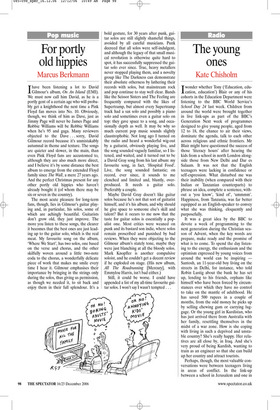For portly old hippies
Marcus Berkmann
Ihave been listening a lot to David Gilmour’s album, On An Island (EMI). We must now call him David, as he is a portly gent of a certain age who will probably get a knighthood the next time a Pink Floyd fan moves into No. 10. Obviously, though, we think of him as Dave, just as Jimmy Page will never be James Page and Robbie Williams will be Robbie Williams when he’s 95 and gaga. Many reviewers objected to the Dave ... sorry, David Gilmour record because it’s unmistakably autumnal in theme and texture. The songs are quieter and slower, in the main, than even Pink Floyd fans are accustomed to, although they are also much more direct, and I believe it’s by some distance the best album to emerge from the extended Floyd family since The Wall, a mere 27 years ago. And the perfect Christmas present for any other portly old hippies who haven’t already bought it (of whom there may be six or seven in the country).
The most acute pleasure for long-term fans, though, lies in Gilmour’s guitar playing and, in particular, his solos, some of which are achingly beautiful. Guitarists don’t grow old, they just improve. The more you listen to these songs, the clearer it becomes that the best ones are just leading up to the guitar solo, which is the real meat. My favourite song on the album, ‘Where We Start’, has two solos, one based on the verse and chorus, and the other skilfully woven around a little two-note coda to the chorus, a wonderfully delicate piece of work that makes me smile every time I hear it. Gilmour emphasises their importance by bringing in the strings only during the solos, thus giving us permission, as though we needed it, to sit back and enjoy them in their full splendour. It’s a bold gesture, for 30 years after punk, guitar solos are still slightly shameful things, avoided by all careful musicians. Punk decreed that all solos were self-indulgent, and although the legacy of that small musical revolution is otherwise quite hard to spot, it has successfully suppressed the guitar solo ever since. True, heavy metallers never stopped playing them, and a novelty group like The Darkness can demonstrate their absolute otherness by lathering their records with solos, but mainstream rock and pop continue to stay well clear. Bands like the Scissor Sisters and The Feeling are frequently compared with the likes of Supertramp, but almost every Supertramp track had a sax solo and possibly a piano solo and sometimes even a guitar solo on top: they gave space to a song, and occasionally depth as well. It may be why so much current pop music sounds slightly claustrophobic. Not long ago I turned on the radio and heard a wonderful wig-out by a guitarist, obviously playing live, and the song sounded vaguely familiar, so I listened, and waited, and it turned out to be a David Gray song from his last album: my favourite song, in fact, ‘Hospital Food’. Live, the song sounded fantastic; on record, ever since, it sounds to me clenched and limited and, bluntly, overproduced. It needs a guitar solo. Preferably a couple.
Maybe David Gray doesn’t like guitar solos because he’s not that sort of guitarist himself, and it’s his album, and why should he give space to someone else’s skill and talent? But it occurs to me now that the taste for guitar solos is essentially a populist one. Most critics were weaned on punk and its bastard son indie, where solos remain proscribed and punished by bad reviews. When they were objecting to the Gilmour album’s stately tone, maybe they were just blanching at all the bloody solos. Mark Knopfler is another compulsive soloist, and he couldn’t get a decent review if he exploded on stage. (His new album, All The Roadrunning [Mercury], with Emmylou Harris, isn’t bad either.) Still, it could be worse. I could have appended a list of my all-time favourite guitar solos. I won’t say I wasn’t tempted ...






































































































































 Previous page
Previous page